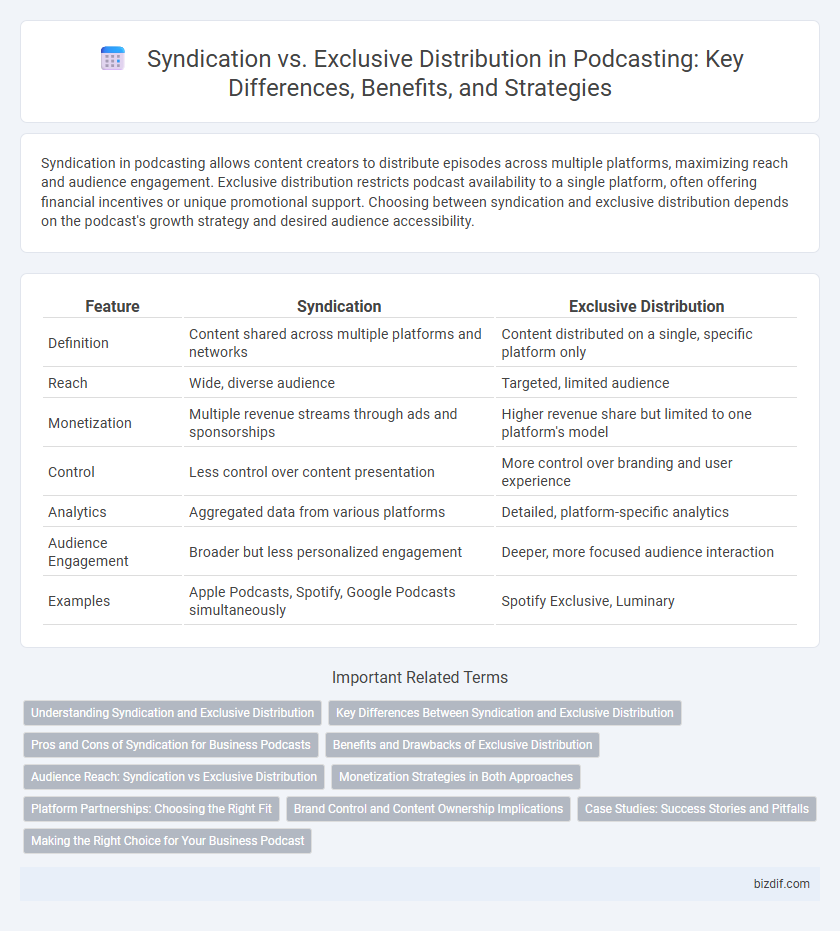Syndication in podcasting allows content creators to distribute episodes across multiple platforms, maximizing reach and audience engagement. Exclusive distribution restricts podcast availability to a single platform, often offering financial incentives or unique promotional support. Choosing between syndication and exclusive distribution depends on the podcast's growth strategy and desired audience accessibility.
Table of Comparison
| Feature | Syndication | Exclusive Distribution |
|---|---|---|
| Definition | Content shared across multiple platforms and networks | Content distributed on a single, specific platform only |
| Reach | Wide, diverse audience | Targeted, limited audience |
| Monetization | Multiple revenue streams through ads and sponsorships | Higher revenue share but limited to one platform's model |
| Control | Less control over content presentation | More control over branding and user experience |
| Analytics | Aggregated data from various platforms | Detailed, platform-specific analytics |
| Audience Engagement | Broader but less personalized engagement | Deeper, more focused audience interaction |
| Examples | Apple Podcasts, Spotify, Google Podcasts simultaneously | Spotify Exclusive, Luminary |
Understanding Syndication and Exclusive Distribution
Syndication in podcasting allows creators to distribute content across multiple platforms, increasing reach and audience diversity by leveraging established networks such as Apple Podcasts, Spotify, and Google Podcasts. Exclusive distribution limits a podcast's availability to a single platform, often offering higher revenue shares or promotional support but reducing overall audience exposure. Understanding the trade-offs between syndication and exclusive distribution is critical for podcasters aiming to balance monetization opportunities with audience growth potential.
Key Differences Between Syndication and Exclusive Distribution
Syndication in podcasting allows multiple platforms or publishers to distribute the same content, maximizing reach and audience diversity, while exclusive distribution restricts content to a single platform or network, often offering higher revenue shares or promotional support. Syndicated podcasts benefit from broader discoverability and increased listener base due to widespread availability, whereas exclusive podcasts leverage targeted marketing and brand association to build loyalty and premium positioning. The choice between syndication and exclusive distribution impacts monetization strategies, audience engagement, and control over content licensing rights.
Pros and Cons of Syndication for Business Podcasts
Syndication in business podcasts amplifies reach by distributing content across multiple platforms, increasing audience exposure and potential lead generation. The downside includes less control over brand consistency and potential dilution of podcast identity due to varying platform policies and user experiences. Monetization opportunities may be limited as syndication often requires shared advertising revenue and restricts exclusive sponsorship deals.
Benefits and Drawbacks of Exclusive Distribution
Exclusive distribution in podcasting offers benefits such as greater control over content, potential for higher revenue through premium deals, and enhanced branding opportunities by creating a unique listening experience. However, drawbacks include limited audience reach, reduced exposure to broader demographics, and dependency on a single platform which can restrict discoverability and listener growth. Balancing exclusivity with accessibility is crucial for maximizing both audience engagement and monetization potential.
Audience Reach: Syndication vs Exclusive Distribution
Syndication expands audience reach by distributing podcast content across multiple platforms, increasing visibility and listener engagement. Exclusive distribution limits availability to a single platform, which can create a loyal audience base but reduces overall potential reach. Choosing syndication maximizes exposure, while exclusive deals typically prioritize brand control and monetization on one network.
Monetization Strategies in Both Approaches
Syndication allows podcasters to distribute episodes across multiple platforms, maximizing audience reach and unlocking diverse monetization streams such as ad networks, sponsorships, and dynamic ad insertion. Exclusive distribution limits content to a single platform or network, often leveraging subscription models, premium content sales, and platform-specific advertising revenue to generate income. Analyzing listener behavior and platform policies is critical in optimizing monetization strategies within syndication or exclusive distribution frameworks.
Platform Partnerships: Choosing the Right Fit
When evaluating platform partnerships for podcast distribution, syndication enables wider audience reach by listing content on multiple platforms like Spotify and Apple Podcasts, increasing discoverability and listener engagement. Exclusive distribution agreements, such as those with Luminary or Wondery, often provide better monetization opportunities through premium content deals but limit audience exposure to a single platform's user base. Choosing the right fit depends on balancing goals for brand visibility, revenue potential, and target audience demographics within the podcasting ecosystem.
Brand Control and Content Ownership Implications
Syndication allows podcasters to distribute content across multiple platforms, increasing reach while maintaining partial brand control, but it often requires sharing content ownership with third parties. Exclusive distribution offers stronger brand control and complete content ownership, enabling podcasters to manage monetization and audience engagement more directly. Choosing between syndication and exclusivity impacts how a podcast's intellectual property is protected and how brand identity is preserved in competitive markets.
Case Studies: Success Stories and Pitfalls
Case studies reveal that syndication enables podcasts like "The Daily" to rapidly expand their audience by leveraging multiple platforms, boosting listener engagement and ad revenue. Exclusive distribution, exemplified by Spotify's deal with "The Joe Rogan Experience," provides creators with lucrative contracts and tailored marketing but risks limiting audience reach and alienating potential listeners on other platforms. Pitfalls in syndication include diluted brand identity and revenue sharing conflicts, while exclusive agreements often face backlash over platform dependency and reduced discoverability.
Making the Right Choice for Your Business Podcast
Syndication offers broader audience reach by distributing your business podcast across multiple platforms and networks, increasing discoverability and potential revenue streams. Exclusive distribution limits your podcast to a single platform, often providing higher monetization rates, better analytics, and tailored promotional support, ideal for brands seeking strong platform partnerships. Evaluate your goals, target audience, and revenue model to determine if maximizing exposure through syndication or leveraging exclusivity for enhanced monetization aligns better with your podcast strategy.
Syndication vs Exclusive Distribution Infographic

 bizdif.com
bizdif.com